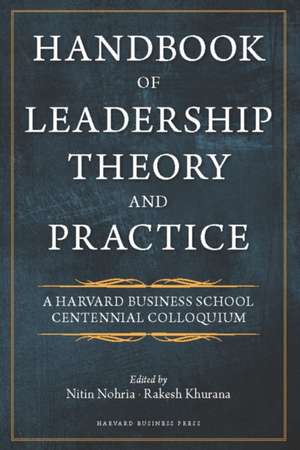Handbook of Leadership Theory and Practice: A Harvard Business School Centennial
Autor Nitin Nohria, Raksesh Khuranaen Limba Engleză Hardback – 31 dec 2009
More than a means of getting ahead and gaining power, leadership must be understood as a serious professional and personal responsibility. Featuring the thinking of today's most renowned scholars, the Handbook of Leadership Theory and Practice will be a catalyst for elevating leadership to a higher intellectual plane - and help shape the research agenda for the next generation of leadership scholars."
Preț: 241.68 lei
Nou
Puncte Express: 363
Preț estimativ în valută:
46.25€ • 48.38$ • 38.42£
46.25€ • 48.38$ • 38.42£
Carte disponibilă
Livrare economică 12-26 martie
Livrare express 26 februarie-04 martie pentru 66.78 lei
Preluare comenzi: 021 569.72.76
Specificații
ISBN-13: 9781422138793
ISBN-10: 1422138798
Pagini: 800
Dimensiuni: 165 x 244 x 55 mm
Greutate: 1.29 kg
Editura: McGraw-Hill Education LLC
Colecția Harvard Business School Press
Locul publicării:United Kingdom
ISBN-10: 1422138798
Pagini: 800
Dimensiuni: 165 x 244 x 55 mm
Greutate: 1.29 kg
Editura: McGraw-Hill Education LLC
Colecția Harvard Business School Press
Locul publicării:United Kingdom
Cuprins
Section I: The Impact of Leadership: Performance and Meaning1: Advancing Leadership Theory & Practice
Rakesh Khurana & Nitin Nohria
2: When Does Leadership Matter? A Contingent Opportunities View of CEO Leadership?Noam Wasserman (Harvard University), Nitin Nohria, and Bharat Anand (Harvard Business School)
3: Revisiting the Meaning of Leadership
Joel Podolny (Yale School of Management), Rakesh Khurana (Harvard Business School), and Marya Hill-Popper (Cornell School of Industrial and Labor Relations)
4: What Is This Thing Called Leadership?
Richard Hackman (Harvard University)
Section II: The Theory of Leadership: Personal Attributes, Functions and Relationships
Chapters that take stock of different disciplinary perspectives on leadership and articulate an agenda for future research
5: Leadership through an Organization Behavior Lens: A Look at the Last Half-Century of Research
Mary Ann Glynn and Rich DeJordy (Boston College)
6: Psychological Perspectives on Leadership
Jennifer A. Chatman and Jessica A. Kennedy (University of California, Berkeley)
7: A Clinical Approach to the Dynamics of Leadership and Executive Transformation
Manfred Kets de Vries and Elisabet Engellau (INSEAD)
8: Classical Sociological Approaches to the Study of Leadership
Mauro F. Guillén (Wharton School, University of Pennsylvania)
9: Economists’ Perspective on Leadership
Patrick Bolton (Columbia), Markus K. Brunnermeier (Columbia), and Laura Veldkamp (NYU)
10: An Economic Perspective on Leadership
Mark. A. Zupan (University of Rochester)
11: Leadership and History
Walter A. Friedman (Harvard Business School)
12: Power and Leadership
Joseph S. Nye, Jr. (Harvard Kennedy School of Government)
Section III: The Variability of Leadership: What’s Core and Contingent
Chapters exploring similarities and differences in leadership across task, culture, and identity
13. Leadership and Cultural Context: A Theoretical and Empirical Examination Based on Project GLOBE
Javidan, Mansour (Thunderbird Business School), Peter W. Dorfman (New Mexico State University), Jon Paul Howell (New Mexico State University), and Paul J. Hanges (University of Maryland)
14. Women and Leadership: Defining the Challenges
Robin J. Ely (Harvard Business School) and Deborah L. Rhode (Stanford Law School)
15. A Contingency Theory of Leadership
Jay Lorsch (Harvard Business School)
Section IV: The Practice of Leadership: Agency and Constraint
Chapters on the multiple facets of leadership practice
16: What is Leadership? The CEO’s Role in Large, Complex Organizations
Michael E Porter (Harvard University) and Nitin Nohria (Harvard Business School)
17: What Makes Teams of Leaders Leadable?
Ruth Wagerman and Richard Hackman (Harvard University)
18: Decision Making as Leadership Foundation
Michael Useem (Wharton School, University of Pennsylvania)
19: Leading Change: Leadership, Organization and Social Movements
Marshall Ganz (Harvard Kennedy School of Government)
20: Leadership in a Globalizing World
Rosabeth Moss Kanter (Harvard Business School)
21: Unlocking the Slices of Genius in Your Organization: Leading for Innovation
Linda A. Hill (Harvard Business School), Maurizio Travaglini (Architects of Group Genius), Greg Brandeau (Pixar Animation Studios), and Emily Stecker (Harvard Business School)
Section V: The Development of Leaders: Knowing, Doing and Being
Chapters on the development of leaders
22: Identity-Based Leader Development
Herminia Ibarra (INSEAD), Scott Snook (Harvard Business School), and Laura Guillén Ramo (INSEAD)
23: The Experience Conundrum
Morgan W. McCall, Jr. (University of Southern California)
24: Leadership Development Interventions: Ensuring a Return on the Investment
Jay A Conger (Claremont McKenna College)
25: Pursuing Authentic Leadership Development
Bruce J. Avolio (Gallup Leadership Institute)
26: Adult Development and Organizational Leadership
Robert Kegan and Lisa Lahley (Harvard Education School)
Rakesh Khurana & Nitin Nohria
2: When Does Leadership Matter? A Contingent Opportunities View of CEO Leadership?Noam Wasserman (Harvard University), Nitin Nohria, and Bharat Anand (Harvard Business School)
3: Revisiting the Meaning of Leadership
Joel Podolny (Yale School of Management), Rakesh Khurana (Harvard Business School), and Marya Hill-Popper (Cornell School of Industrial and Labor Relations)
4: What Is This Thing Called Leadership?
Richard Hackman (Harvard University)
Section II: The Theory of Leadership: Personal Attributes, Functions and Relationships
Chapters that take stock of different disciplinary perspectives on leadership and articulate an agenda for future research
5: Leadership through an Organization Behavior Lens: A Look at the Last Half-Century of Research
Mary Ann Glynn and Rich DeJordy (Boston College)
6: Psychological Perspectives on Leadership
Jennifer A. Chatman and Jessica A. Kennedy (University of California, Berkeley)
7: A Clinical Approach to the Dynamics of Leadership and Executive Transformation
Manfred Kets de Vries and Elisabet Engellau (INSEAD)
8: Classical Sociological Approaches to the Study of Leadership
Mauro F. Guillén (Wharton School, University of Pennsylvania)
9: Economists’ Perspective on Leadership
Patrick Bolton (Columbia), Markus K. Brunnermeier (Columbia), and Laura Veldkamp (NYU)
10: An Economic Perspective on Leadership
Mark. A. Zupan (University of Rochester)
11: Leadership and History
Walter A. Friedman (Harvard Business School)
12: Power and Leadership
Joseph S. Nye, Jr. (Harvard Kennedy School of Government)
Section III: The Variability of Leadership: What’s Core and Contingent
Chapters exploring similarities and differences in leadership across task, culture, and identity
13. Leadership and Cultural Context: A Theoretical and Empirical Examination Based on Project GLOBE
Javidan, Mansour (Thunderbird Business School), Peter W. Dorfman (New Mexico State University), Jon Paul Howell (New Mexico State University), and Paul J. Hanges (University of Maryland)
14. Women and Leadership: Defining the Challenges
Robin J. Ely (Harvard Business School) and Deborah L. Rhode (Stanford Law School)
15. A Contingency Theory of Leadership
Jay Lorsch (Harvard Business School)
Section IV: The Practice of Leadership: Agency and Constraint
Chapters on the multiple facets of leadership practice
16: What is Leadership? The CEO’s Role in Large, Complex Organizations
Michael E Porter (Harvard University) and Nitin Nohria (Harvard Business School)
17: What Makes Teams of Leaders Leadable?
Ruth Wagerman and Richard Hackman (Harvard University)
18: Decision Making as Leadership Foundation
Michael Useem (Wharton School, University of Pennsylvania)
19: Leading Change: Leadership, Organization and Social Movements
Marshall Ganz (Harvard Kennedy School of Government)
20: Leadership in a Globalizing World
Rosabeth Moss Kanter (Harvard Business School)
21: Unlocking the Slices of Genius in Your Organization: Leading for Innovation
Linda A. Hill (Harvard Business School), Maurizio Travaglini (Architects of Group Genius), Greg Brandeau (Pixar Animation Studios), and Emily Stecker (Harvard Business School)
Section V: The Development of Leaders: Knowing, Doing and Being
Chapters on the development of leaders
22: Identity-Based Leader Development
Herminia Ibarra (INSEAD), Scott Snook (Harvard Business School), and Laura Guillén Ramo (INSEAD)
23: The Experience Conundrum
Morgan W. McCall, Jr. (University of Southern California)
24: Leadership Development Interventions: Ensuring a Return on the Investment
Jay A Conger (Claremont McKenna College)
25: Pursuing Authentic Leadership Development
Bruce J. Avolio (Gallup Leadership Institute)
26: Adult Development and Organizational Leadership
Robert Kegan and Lisa Lahley (Harvard Education School)
Notă biografică
Nitin Nohria is the Richard P. Chapman Professor or Business Administration, Senior Associate Dean, and Director of Faculty Development at Harvard Business School. He is the author of numerous books and articles.Rakesh Khurana is an Associate Professor of Business Administration at Harvard Business School, and author of numerous important articles and books in the areas of leadership and management.















